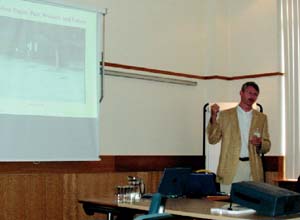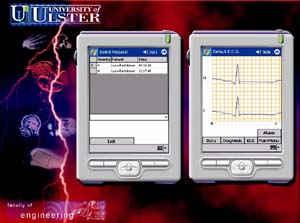| 2004 |

|
YEAR BOOK |
University of Ulster
|
Computer Science research at UU
|
Core research activities are in Information Engineering, Software Engineering, Intelligent Systems, Artificial Intelligence and Medical Informatics, including Bioinformatics. Information Engineering includes both Image Processing and Internet Technologies. The Northern Ireland Knowledge Engineering Laboratory and the Centre for Software Process Technologies provide outlets for the application and exploitation of our core research. High levels of funding are attracted from national and international funding bodies, and there are currently approximately 80 PhD students. There are strong collaborations locally in research and development programmes of technology companies, throughout Europe in research projects partnering government, commercial and educational institutions, and globally with research institutions, particularly in China and the USA, to establish internationally recognised centres of excellence.
Within the telecommunications area, initiatives with China include Royal Society � National Science Foundation China funding for research collaborations, and partnership in an EPSRC programme to establish a UK-China network. Closer to home there is membership of the Commission for Communications Regulation (ComReg), the Irish National Regulatory Authority for telecommunications, and a keen involvement in developing an all-Ireland Telecommunications and Internet Technologies Research Alliance.
North South Awards
Computer Science at UU was successful in achieving two of the 2003 awards within the North South Research Programme Strand 1, funded by the Higher Education Authority:
-
�INTERconnections by Electromagnetic WAVE Propagation in Silicon-based Artificial Spiking Neural Networks (INTERWAVE)
is a collaborative project with University College Cork and the National Microelectronics Research Centre (NMRC). The project aims to develop a completely radical approach to the implementation of high density spiking neural networks in VLSI. The intention is to use electromagnetic waves to propagate 'temporal events' between multiple neurons on a chip. The basic principle that underpins what is being proposed is the utilisation of Electro-magnetic (EM) waves to propagate spike events between neurons.
-
�Combining prior domain knowledge and data mining for biomedical decision support
is a collaborative project with Trinity College, Dublin. This project aims to design and implement techniques to incorporate prior domain knowledge into the biomedical decision support process. Three types of prior knowledge representations will be studied: ontology-based knowledge schemes, non-ontology-based structures, and domain constraints. Machine learning methods will be adapted and new models will be proposed to support the integration of prior knowledge, which may significantly improve the effectiveness, efficiency and understandability of key decision support functions. The resulting methods will be tested on a diabetes decision support and information management system. Three PhD students have been recruited.

Conferences and Workshops
UU has recently hosted a number of international conferences and workshops:
-
�Soft-Ware conference 2002: 'Computing in an Imperfect World'
-
�Eurographics Ireland workshop 2003
-
�European Science Foundation Workshop (Data Mining in Bioinformatics) 2003
-
�Irish Machine Vision and Image Processing (IMVIP) conference 2003.
Medical Informatics
The Medical Informatics Recognised Research Group applies computational techniques to assist medical research. The work involves collaboration with local hospitals, other university departments, technology providers, local health charities and patients. The main activities comprise research in the areas of knowledge acquisition and dissemination, telemedicine, and medical imaging. These activities fall under the general umbrella term eHealth.
Telemedicine collaborations at the Ulster Hospital (Dundonald) have been expanded to reflect these activities, and the Ulster Institute of eHealth will be launched in September 2004. Existing telemedicine projects include the remote diagnosis of the electrocardiogram (ecg) by a physician. This may be achieved by recording the ecg at an appropriate location, e.g., clinic, hospital department or the home. The waveform is then transferred to a secure central server, where it can be accessed by the specialist using appropriate display technology. The doctor may use a standard computer or, alternatively, a personal data assistant linked via the wireless network installed at the Ulster Hospital.

Contact: Professor Bryan Scotney, University of Ulster,
School of Computing and Information Engineering, Cromore Road, Coleraine;
Tel: 028 70324648; E-mail: [email protected]